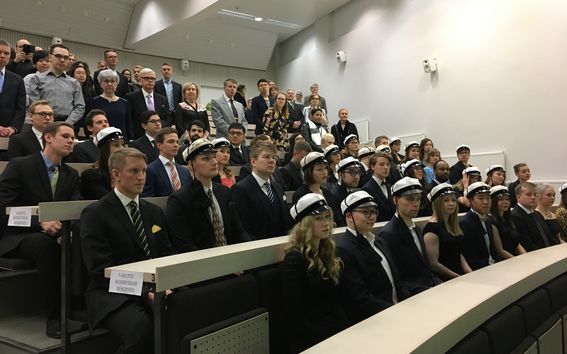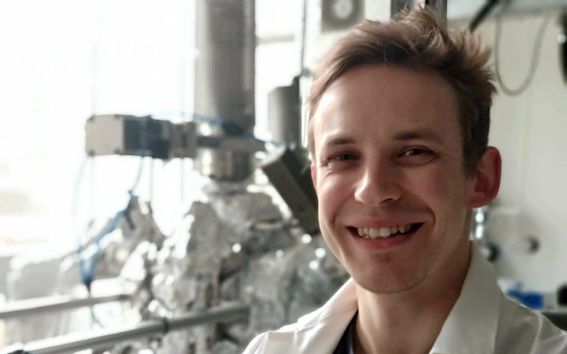Mikko Nisula’s research into lithium-ion batteries resulted in a Dissertation of the Year award and a researcher’s position at Ghent University

Doctor of Science (Technology) Mikko Nisula received his doctorate from the Department of Chemistry and Materials Science in February 2018. Prizes were awarded to the best master’s theses and doctoral dissertations 2018 at the graduation ceremony on 27 March 2019. Nisula could not make it to the ceremony to accept his prize from Dean of School of Chemical Engineering Kristiina Kruus, as he is continuing his career at Ghent University in Belgium.
“I started my studies at the Helsinki University of Technology in 2004 before it merged into Aalto University. In upper secondary school, I was not quite sure where to continue my studies, but I have always been interested in chemistry. The opportunity to combine natural sciences with technology attracted me to the Helsinki University of Technology.
In the beginning of my studies I lacked a little bit of enthusiasm. The basic courses were not quite what I had expected, and sometimes I even considered changing the field. At the end of my undergraduate studies, I had a summer job in a laboratory of inorganic chemistry. That was a stroke of luck!
Mikko NisulaLearning more about research in the field opened up a new world.
The best thing was that the research did not settle for existing solutions but aimed at creating something entirely new, such as previously unknown materials.
After this, I found new motivation to study. I did not hesitate when Professor Maarit Karppinen offered me a post-graduate study place after the completion of my master’s thesis.

More or less by chance, my research on the application of Atomic Layer Deposition (ALD) into the manufacture of lithium-ion batteries, which started as a side project, became the topic of my dissertation. Such batteries could be used in microelectronics. For example, the Internet of Things (IoT) would require an enormous amount of small probes and sensors, which could collect data independently and submit it to the network. However, the bottleneck is the existing battery technology, as it is not suited for the manufacture of sufficiently small batteries.
The goal of my dissertation was to tackle this challenge by developing a new thin film battery, which would utilise environmentally friendly organic electrode materials instead of traditional materials that include heavy metals. By using the atomic/molecular layer deposition technique (ALD/MLD), we were able to reduce the total thickness of the battery to under 100 nanometres. This technique involves constructing the battery literally by one atomic and molecular layer at a time. In practice, I developed the appropriate materials for each battery component, and eventually constructed an entire battery cell from these components. The resulting battery was very powerful, but its capacity needs a bit more work.
After my dissertation, it felt natural to continue my academic career, and I now work as a Post-Doctoral Researcher at Ghent University. My work with the molecular layer deposition technique continues, but I am currently particularly interested in molecular electronics. My goal is to develop hybrid materials consisting of organic and inorganic components, the electric conductivity of which could be dynamically controlled by changing their oxidation state. This so-called resistive switching phenomenon resembles, in part, the activity of neuronal synapses, and it could be used for developing artificial intelligence."
Best Master's Thesis:
M.Sc. (Tech) Aino-Maija Leppä
Genomic characterization of hematopoietic stem and progenitor cells in multiple myeloma to study patterns of disease evolution
M.Sc. (Tech) Abitha Venkatramani
Feasibility study of low grade waste heat recovery technologies for energy efficiency
M.Sc. (Tech) Rasmus Kronberg
Ab initio molecular dynamics simulation of the platinum-water interface: Insights into structure and electrocatalytic properties
M.Sc. (Tech) Oskar Wegelius
Liquefaction of lignin: Uncatalysed and catalysed ethanolysis
Best Doctoral Dissertations:
D.Sc. (Tech.) Nico Holmberg
Hydrogen Evolution Reaction on Carbon Nanotubes: Insights from Electronic Structure Theory (Supervisor Kari Laasonen)
D.Sc. (Tech.) Meri Lundahl
Wet-spinning of Cellulose Nanofibril Hydrogels (Supervisor Orlando Rojas)
D.Sc. (Tech.) Pezhman Mohammadi
Biologically Inspired High Performance Material (Supervisor Markus Linder)
D.Sc. (Tech.) Mikko Leander Nisula
Atomic/ Molecular Layer Deposition of an All-Solid-State Thin-Film Battery Based on Organic Electrode Materials (Supervisor Maarit Karppinen)
Read more news

DeployAI Partners Gather for Heart Beat Meeting in Helsinki
The European DeployAI project's partners gathered for the Heart Beat meeting hosted by Aalto University Executive Education in Helsinki.
Online AI course could boost study equality
Students at the School of Business believe that mastering Artificial Intelligence (AI) can be beneficial for both academic success and career prospects, as AI becomes increasingly integrated into daily life.
2 027 new students admitted to Aalto University’s Finnish, Swedish bachelor’s programmes
13 500 applied to Aalto University in Finland's spring joint application in 2024